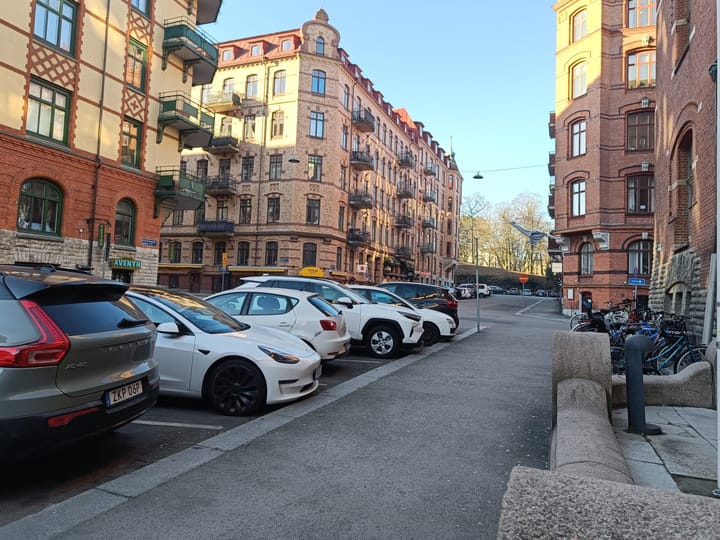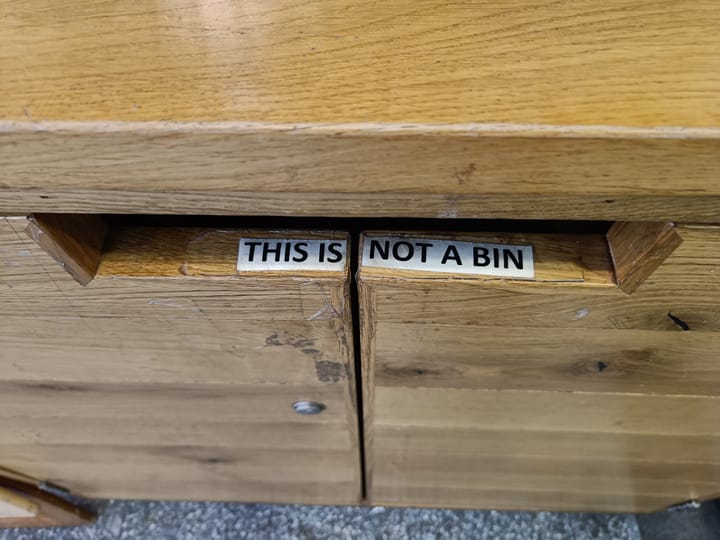week 14 / 2025
Organic patterns emerge from deterministic rules, causal connections go unnoticed—WEEKNOTES start the simulation and sees what happens. This week, ecosystems get their freak on, and Solarists reach the edge of the rational.

I saw that generative Brian Eno documentary this week, and enjoyed it. I now sort of want to see it a few more times, in order to get a sense of exactly to what extent it’s generative. Like, are all of the major sections randomly spooled in from a larger collection thereof, or is there an overall basic structure of core scenes with insertion points pre-prepared for the randomised introduction of the smaller, uh, ambient bits?
That’s precisely the wrong word, of course, in light of what the man himself is talking about—and therein lies a nagging sense of aesthetic mismatch. So much of Eno’s generative work is about making music that’s close enough to organic iterative process that you don’t notice the gradual shifts and changes, or indeed the artifice overall. The film, meanwhile, makes a big and oddly cod-cyberpunk show of its stitchedness, complete with weird bit-munged sounds and gnomic filenames scrolling by in terminal fonts between scenes. Certainly it’s generative, though not in Eno’s sense of the term, and not at all ambient… and as I note above, I wonder just how different any two viewings actually are.
There’s something very boyish about Eno, even now, and one of the early fragments in my viewing hinted at why: in some live interview in (I assume) the late 1980s, he’s asked if he remembers the first piece of music that really affected him, and he says yes, it was “Get a Job” by The Silhouettes, and it had two main impacts: he decided that this was what good music sounded like, and he decided that he was never going to get a job. He goes on to note that he’s never really had one, either, and maybe that boyishness is due in part to that—the (deserved) cliche of the artist as a child at play, perhaps.
I was mildly irked toward the end, when the environmental question surfaced. He first makes an important point (paraphrasing someone whose name I don’t recall) by saying that as human beings we have a tendency to overestimate what we can do in a day, and underestimate what we can do in ten years. Shortly afterward, though, he observes something to the effect that “human ability is increasing exponentially”—this being the bit of Eno that got involved in the Long Now Foundation, obvs—and that it’s a good thing it is, because the environmental crisis is also increasing exponentially.
It’s hard not to be disappointed when an intelligent, thoughtful person of Eno’s ilk can’t seem to see the direct causal relation between those two exponential increases.
ticked off
- Six hours on PROJECT HORNIMAN. (Fewer than I had hoped to do, and less successful than I hoped they’d be—but sometimes that’s just the way it goes, particularly with long-form writing.)
- Five hours of admyn. (Sweeping up bits dropped during the March madness, here, plus the usual start-of-month stuff.)
- Four final hours on PROJECT ADVANTAGE. (Including a final wrap-up meeting with my client and their client, all of whom seemed very happy with what we’d managed to achieve in a fairly tight timeframe. Turned out to be more fun than I expected, this one.)
- Three hours on PROJECT PORTON. (Bit of a lull phase in this one, which to be honest is pretty welcome.)
- Five hours writing my next column for Vector. (I had kinda forgotten about this due to busyness, and then came the reminder email from my editor. Luckily, I’d been sitting on a vague idea for it for a while, and managed to blast out a fairly decent draft; it’ll need a buff and polish over the weekend, but nothing too heavy.)
- Two hours of STPLN stuff. (A talk by a union that specialises in creative self-employed types. Very timely, as it was becoming very obvious that—quite reasonably—the academic union I joined when I moved here wasn’t really cut out for understanding my new circumstances. So now I’ve jumped ship for DIK!)
- One hour pasting up and prepping this week’s essay on This Very Website. (Bit of a lazy one, really, repubbing a piece I wrote for someone else… but there was no way I was going to be writing something new in time. Gotta be realistic about this stuff, innit.)
- Ten hours of undirected writing and reading, som vanligt.
A bitty sort of week, and a little low on hours… but I worked all of last weekend, so I’m cutting myself some slack. That said, I think I need to be careful to rest properly this weekend…
kinmaking
Spent an hour in the blazing sunshine on Wednesday with my urbanist friend Gustav Magnusson, cooking up plans for an odd-ball side project… watch this space, wot?
Also had a great chat on Friday with Jason Dinsdale, futures lead at the UK Environment Agency. Once we got past comparing notes on the Stourbridge music scene of the very early 1990s, we kicked around all sorts of topics, but particularly the importance of story for getting beyond the knowledge-deficit approach to climate communications, by way of various Climaginaries projects and—of course—Saint Donna’s notion of the god-trick. Cheers for letting me talk your ear off, Jason!
reading
I guess I’m going to have to file Stanislav Lem’s Solaris in the stack of books that I was sure I’d read before, but maybe actually hadn’t? I can’t even blame the movies, as I’ve never seem either version…
Any which way, it read as very fresh to me. I hadn’t realised the extent to which it’s an exploration of the philosophy of the hard sciences, but from the soft side of the fence, so to speak; were I feeling particularly punchy, I might even try to claim it as a work of STS avant la lettre. The viewpoint character spends a lot of time thinking about his work, and Lem has the knack of making this come across very much like academic discourse—indeed, the resemblance is uncanny, so I guess Lem must have spent a lot of time around scientists and their literatures (and their internecine disputes). The juxtaposition of this historicised and hyper-rationalist reflection with the more emotional material sets up the conflict between the supposed objectivity of science and the inescapable subjectivity and emotional motivations which—protest as it might—the former can never hope to expunge…
... which, I realise, makes it sound very dry and worthy, when it’s actually a psychological existential sci-fi horror of considerable sophistication, and way ahead of its contemporaries in terms of literary qualities. Nonetheless, while we often joke about science fiction as a genre being mostly devoid of the ‘science’ that people assume they’ll find abstruse or confusing, Solaris actually has exactly that sort of science going on, even though it’s almost entirely imagined science concerned with the possibly-sentient ocean of an alien planet.
So, a cautious recommend: not exactly an easy read, whether technically or emotionally, but a very rewarding one.
a clipping
Shout-out to my main man Sjef van Gaalen for this week’s clipping, a long piece at BBC Future that hangs on a real standing ovation of a neologism: what should we call the results of centuries of human intervention in the mixes of plants and animals in different parts of the world, if not “freakosystems”?
O'ahu's mountainous terrain – a filming location that has evoked heroic, untrammelled wildernesses in the Jurassic Park and King Kong films – is shaped "at every level" by human action, says Jef Vizentin-Bugoni, a Brazilian ecologist at Universidade Federal de Pelota who researched the island's birds with Tarwater. He recalls having his expectations upturned when he arrived on the island in 2017, eager to see Hawaii's famous honeycreepers, a set of brightly coloured native bird species that exist nowhere else in the world. Instead, he was first confronted with an unfamiliar flurry of red and white feathers, which turned out to be a red-whiskered bulbul, a bird whose native range spans from India to Southern China.
"I followed it as it flitted between trees until it stopped to feed on a fruit I immediately recognised – guava, a plant native to Brazil," he says. "That moment captured the essence of what's happening in Hawaii: a South American plant being eaten by an Asian bird on a remote Pacific island."
It’s a long read, lots of detail, and has at least one fact which made me laugh out loud. The subbie has framed it as “a warning from the future”, but I honestly find it quite hopeful; the implication is that a world without (so many) of us humans in it will probably muddle its way to a new balance pretty quickly, but as the article points out, that’s not what people still stuck in the well-intentioned but counterproductive frame of “saving” “Nature” want to hear.
The thing is, as our much-missed Oncle Bruno explained, there is not and never was any stable, preservable ontological thing that we could call Nature… but that’s a big chewy topic, so we’ll save it for another day.
That’ll do, then. Here’s hoping that the weather wherever you’re reading from is treating you well!
This has been the Worldbuilding Agency weeknotes for Week 14 of 2025. Thanks for reading! If you've enjoyed them, it's free to subscribe. If you are already subscribed, please send to a friend who you think might also like it!





Comments ()